
Recently on Cyclingnews.com |
Vuelta a Espana feature, August 28, 2006
Foreigners need not apply
The Vuelta a Espana took nearly thirty years longer to get off the ground than the Tour de France and the Giro d'Italia. The early years of the race were wrecked by the Spanish Civil War and World War II. The organisers of the Vuelta did not help its cause in the long term by discouraging foreign participation. By Les Woodland.
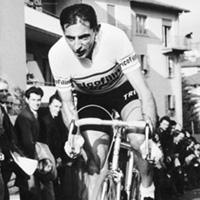
|
My mother-in-law wasn't impressed by the Vuelta. And nor was I, to be honest. We'd planned to drive up the col de Tourmalet and take the cable car from La Mongie to the observatory at the top of the Pic du Midi. Just before the mountains, though, a policeman stopped us and told us we had to wait because a bike race was coming through.
We asked which race and the policeman told us, as though it was as much a nuisance to him as it was to us, that it was the Tour of Spain. So we had lunch and awaited the spectacle.
It never came. Junior races have caused more commotion. There was a rush of cars driving importantly through the village, then a gap of several minutes and finally a great gaggle of riders who seemed in no great hurry to get anywhere. Moments later things were as quiet as they had been before. The dozen or so people on the street turned and went off, maybe as unimpressed as we were, and the Vuelta rode on towards the Tourmalet.
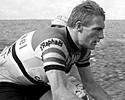
|
Now it's true that the Vuelta was a fish out of its own waters. It was in France and if the morning paper had mentioned it then it was only noted among the other potential traffic problems of the day. But the Vuelta is very much number three of the big Tours and a lot of that is of its own making.
While the Tour started in 1903 and the Giro in 1909, Spain didn't get going until 1935. And then it had a winner who'd done little more in his life than win two minor road races. He was Belgian called Gustaaf Deloor and he rode the Vuelta only because in 1934 he'd had a trip to the Tour of Catalonia, found that Spanish racing wasn't very hard and came back next year with a bunch of pals.
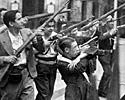
|
The six Belgians dominated the new Vuelta so successfully that 21 of the field of 50 went home before the end. Deloor won three stages, came second on two more and third in another three. Spain was so old-fashioned that huge offence was created after the stage from Séville to Cáceres when one of the Belgians tried to kiss the girl who presented his bouquet. The woman was unmarried and it was outrageous to kiss her in public. François Adam was lucky to escape without being tied to a donkey and hauled out of town.
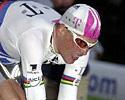
|
Deloor had won the Vuelta, but he was still useless back home in Belgium. People aren't stupid and another bunch of Belgians set off for Spain the following year to once more win lots of money without great physical exercise. Among them was Deloor's brother, Alphonse, and the brothers came first and second. Gustaaf died recently in 2002, aged 88.
Things weren't going well for Spanish cycling but they were even worse for everyone else. It was all very well having bikie pride dented by ropey Belgians but there were other things to worry about. On July 17, 1936, the year of Deloor's second win, Spain broke into civil war and a million died.
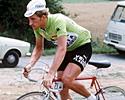
|
Brother fought brother and there wasn't another Vuelta until 1941. The irony then was that the world was at war but Spain had settled into uneasy peace. Franco wanted the Vuelta to distract the country from its troubles. It helped that Spain filled the podium - Julian Berrendero, Fermin Trueba and José Jebardo - but the opposition wasn't even as strong as a bunch of holidaying Belgians. Locals won again the following year, when Berrendero led from start to end, but world war was too great an obstacle and the Vuelta was cancelled until 1945.
By then Spain was wrecked by civil war and isolated by world war. People who knew poverty were pushed back a further 30 years. The Vuelta went ahead on roads that were heavily potholed or even unsurfaced. The 300km from Verin to Valladoid flatted 83 tyres. And luxury hotels that riders had been promised just didn't exist.
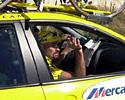
|
Yet it went on. It was uniting a nation. If good foreigners weren't encouraged, that was fine. Spain needed Spanish winners. No foreigner wore the leader's jersey from 1941 to 1947. It was the mid-50s before Spain felt confident enough to invite outsiders systematically. And there was trouble when foreigners were judged not to be earning their money. In 1959 Fausto Coppi was told to go home without his 11,000 pesetas a day and almost all the Italians went with him.
A late start
France had strong foreign riders participate in its national tour from its beginnings; the lack of foreign participation is the reason why the Vuelta has always been the least convincing Tour. People could win who rarely won stage races elsewhere. Rudi Altig in 1962, for instance, the cyclo-cross star Rolf Wolfshohl in 1965, the world hour holder Ferdi Bracke in 1971. And Freddy Maertens, who won 13 stages in 1977.
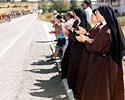
|
Spain hasn't been well treated in return. Jan Ullrich went home partway through the 2000 race with neither he or his helpers bothering to speak Spanish at the press conference. Marco Pantani, the world's best climber, got within sight of the mountains the following year and called it a day.
The Vuelta has moved from April to September, a change at first regarded with suspicion but now welcome because there's less competition in the calendar. The race distance is 2,800km compared to 3,500 in France and 3,700 in Italy. There are no more 250km stints that only the Spanish could manage in the heat. Instead there are punchier stages and more steep climbs because the Spanish climb well. Hence the showpiece climb of the Angliru at Riosa, a village which can't afford even good street-lighting.
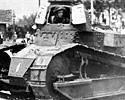
|
Spanish fans love the Angliru and support their own. One Euskaltel rider said, "During the two hardest kilometres we didn't even have to pedal." Or, as a team manager put it, "The riders reached the top with their backsides black from the hands that had pushed them there."
It is now a good race. But the fact that it can pass my mother-in-law and me without causing either of us to look up much from our lunch shows why it is the number three Tour.
